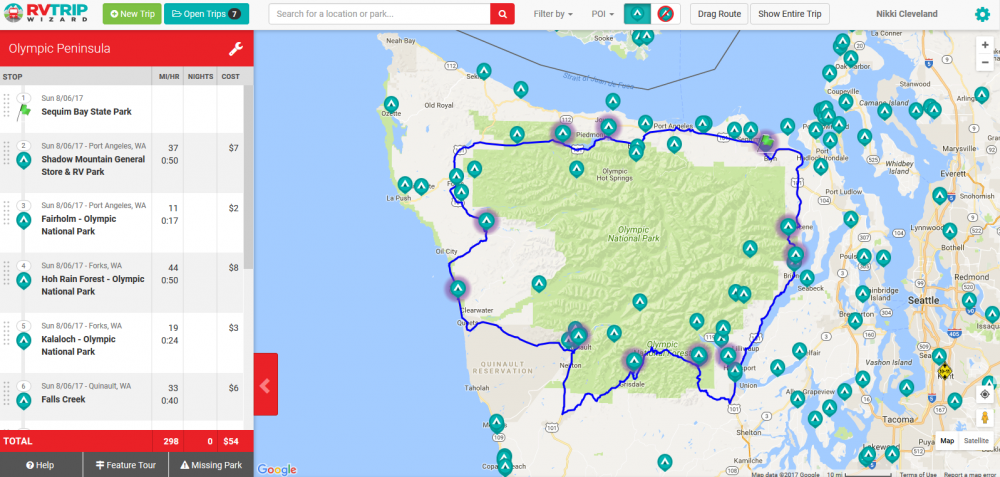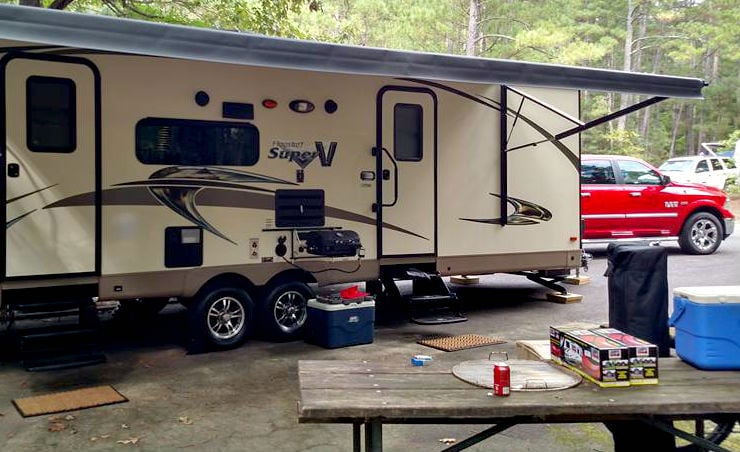Water hose, sewer hose, park adapters, and leveling blocks are a given when it comes to outfitting an RV. But what about other essential camping gear that can make your experiences more enjoyable?
These are just five of the essential camping items you won’t want to forget.
Among all of the essential camping gear, I won’t leave home without a GPS. While I still bring good, old-fashioned road maps, I carry them primarily as a back-up. But a dash-mounted GPS guides me and my wife to all of our destinations. Not only does it provide turn-by-turn audio navigation but it instructs you on what lane to be in to make your turn/exit, and provides details on real-time traffic delays and detours for shorter routes.
If you have a larger RV, you can even buy units designed to navigate around low clearances and weight restrictions. Plus, there are many RV trip planning resources to consider for reliable navigation. Our favorite is RV LIFE Trip Wizard.

RV LIFE Trip Wizard is a popular tool for planning routes. Read more about it here.
2. 12-volt tankless air compressor
Readily available compressed air can mean the difference between a short delay and a multi-hour wait for road service when it comes to filling an underinflated tire (after checking tire pressure).
This is an essential piece of camping gear as it has multi-purposes. It can come in handy for bicycle tires, sports balls, and other outdoor equipment. Look for a compressor that can offer higher pressures like 150 psi and operate on 12 volts.
3. Mobile WiFi hotspot or WiFi booster
This is a newer piece of essential camping gear among RVers as many travelers need to get online from time to time. While many RV parks advertise free WiFi, few can deliver enough bandwidth to meet the needs of everyone in the park (when at peak capacity).
Your smartphone can serve as a mobile hotspot or you can purchase a stand-alone device. Simply skip the frustration and get the most out of your WiFi connection on the road by carrying a hotspot device or a WiFi booster to get a faster connection when you need it.
4. Long nose, refillable butane lighter
How many times have you asked your travel partner, “Where’s the lighter?” Yes, most RVs have direct spark ignition appliances and a piezo igniter for the stove top. But you will still need to light the oven pilot light, the stove burners (when the piezo becomes finicky) gas grill, and of course, the nightly campfire.
5. Headlamps
Backpackers and tent campers have considered a good headlamp essential camping gear since they were invented. RVers should carry one for the same reasons as there are many camping tasks—even with an RV—that require two hands.
So, unless you have a third hand, using a handheld flashlight can be difficult at times. Several of these little jobs include connecting the water hose, opening a baggage compartment, stowing the patio awning (when unexpected weather arrives in the middle of the night), hitching/unhitching, etc.
This is far from an exclusive list of essential RV items. But, if you are new to RVing or require new “tools of the trade” these will help make your next RV trip an even more positive experience.


Great list, Thanks. We never thought of carrying a refillable butane lighter or Wifi booster but they make a difference to bring them along. Thank you for the eye opener.
I just purxhase my first RV. It is a 30 foot coachman. I purchased 4 sissor stabilizers. i am going to have them welded onto the frame. Question what is rje best place to put them and will it affect the driving or handling of the rig. Thans for the response.
PJ, Compared to the weight of your RV, the weight and placement of the jacks will make virtually no difference regarding driving or handling of the rig. What you should really be considering is where is the place to mount them on the rig to maximize stabilization without sacrificing ground clearance (think dragging when entering / exiting urban fueling stations where there are curbs and sidewalks).
Thanks for your reply. Where would the best places. I was thinking one set behind the rear tires and rhe other just under the iving area slidw out. What are your thought. Either was it wouls leave 10ish inches of clearance
PJ, There are many schools of thought on the best way to stabilize a travel trailer. I suggest you do an online search for “best place to mount stabilizing jacks on a travel trailer”, grab a cup of coffee and spend an hour or so studying up.
THANKS HAVE BEEN RESEARCHING THE INTERNET AND DRINKING STRONG THAN COFFEE. LOL
I HAVE BEEN AND BEEN DRINKING MORE RJAT COFFEE. THANKS FOR YOUR RESPONSE.
Great information, what are your thoughts on including a rear observation camera?
They are nice to have, although I wouldn’t consider it one of the top five items.
I would. I don’t have anything that runs on propane, so cameras are more important.
As a first time 5th wheel owner I bought one because I thought it would be a great idea to see what is behind you when backing up (parking). Granted, not required if you have a spotter. First day bringing home new trailer (without camera) and cutting all the limbs on the trees in my yard II put a dent in the side about 12 feet up by bedroom window. ( I call it a birth mark–lol) I thought after buying a single camera and mounting it ( and finding out how great it is ) why not get one for each side…You always have a blind side.
Like I say, you can live without it if you always have a spotter..
Toolkit with socket set, solar suitcase, spare grease caps, grease gun, hitch locks, Kampnik app, spare fuses, I could go on.
These are all more important than a headlamp. You won’t need a headlamp to figure out your trailer is missing.
Just a thought… depending on how far you are going and how long you will be away. Also in conjunction with the “on board navigational system”.
We have found that bringing any club membership cards such as Legion, Lions, Good Sam, KOA, CAA are always an asset.
You never know when you may want to reach out to these organization when you are traveling.
Nothing more pleasant than to be invited to an event in a small town and making more friends. (Even if it is a local Fund Raiser.)
GPG
I bought a backup camera for my pickup. I mounted the camera on a magnet. I also have a small jumper battery pack that I can plug the camera into . I can move the camera and screen easily to any vehicle or trailer that I want to use.
Just an idea.
I think the main thought of this article is the author finds certain items are indispensable but strongly implied is this is a starting point. Other RVers will add their own indispensable items to the core devices or things. Commenters have born this out. I agree with a couple pf comments: a tool kit and a hands free light.
I’m a recently retired bus driver. Discovering l.e.d. lights that clip to my cap brim was a God-send the last few years of my career. No more flashlight-in-the-mouth with drool going down my neck on a dark December morning as I did my required CDL pre-trip. I used to buy these lights for 5 bucks at the Harbor Freight a mile from my house.
I might add to the critical list a good first aid kit and fire extinguishers. I thank the author for getting us to think about what things are essential. Not an all inclusive or exhaustive treatise . . .
I thought I was the only one with drool going down my neck!😂😂😂😂😂
We like our heated mattress pad and electric fry pan. Luxury maybe but not a lot of weight and we don’t pay for the power.
For me, one of the most important things to bring along is my 20v impact with a 3/4″ socket for the rear stabilizer jacks on my 5er. Spare fuses, my tool box, the gas grill and my big truck (semi)/RV GPS as a back up in case the built in nav in my tow vehicle decides to bite the bullet.
I always keep the 5er stocked with clothes, towels, sheets, toiletries, dishes, pots & pans, canned goods and a full water tank,
When I need to hook up and go, all I have to do is load the dog food, their treats and meds, my meds, medical electronics, iPad,Laptop, blu rays, my guns and stock the fridge.
Everything else is already loaded, just in case I have to evacuate because of an approaching hurricane. 20+ years in the Navy taught me to plan ahead so that I have options and I won’t have to run around like a chicken with my head cut off when inclement weather approaches when time becomes a precious commodity and can be the difference between life and death.
One of the most important things I added to my tow vehicle is a third brake light backup camera, I painted a white stripe on the top of the king pin box, which allows me to connect the hitch the first time without having to have keep getting out to readjust my line. There are times that I wish I had kept my Pete when I retired from truck driving.
Number one and two, common sense and patience !
After meeting a camper (tag-along trailer) in Alaska without a jack or lug wrench I would say they might be considered the top items.